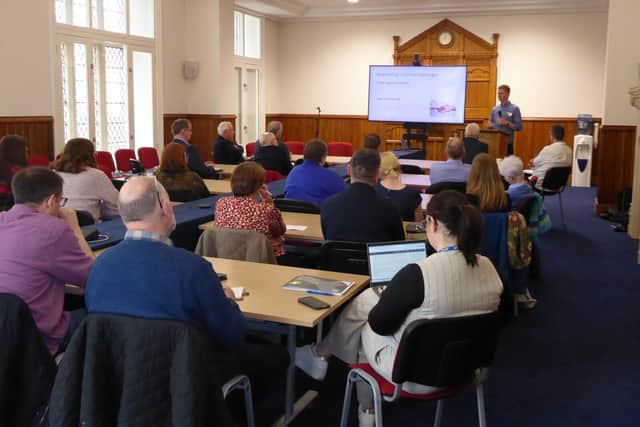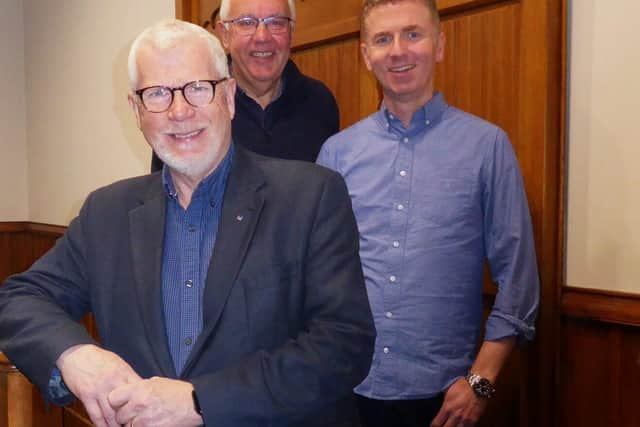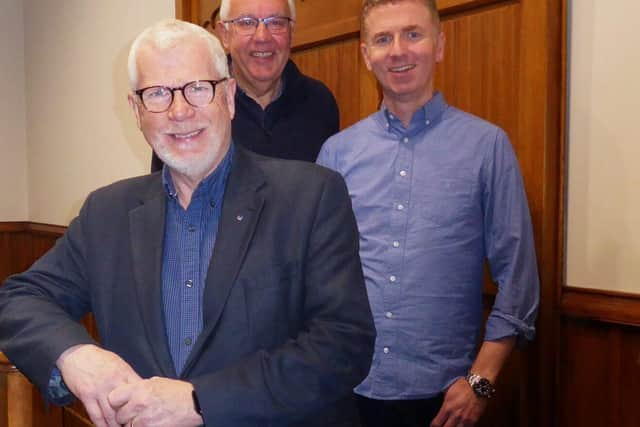Encouraging the healthcare chaplains
and live on Freeview channel 276
Organised by PCI’s Council for Mission in Ireland (CMI), the central body responsible for the broad range of PCI’s chaplaincy provision, the conference also discussed some of the various ethical challenges that chaplains may need to navigate, from both a theological and medical perspective.
Speaking after the conference, which was held in PCI’s Assembly Buildings in Belfast, Rev Robert Bell, Convener of CMI’s Chaplaincy Committee, said that he welcomed the opportunity to bring the healthcare chaplains together in this way.
Advertisement
Hide AdAdvertisement
Hide Ad“As a Church we have a long history of providing pastoral support through our chaplains to many different people across many different aspects of national day-to-day life, be it in our universities and colleges, prisons, the armed forces, and more recently in the rural community. We have around 30 chaplains, full and part-time, men and women, who work in hospitals and other health settings across the island. Today was an important opportunity to bring many of them together for fellowship, a time of prayer, teaching and discussion,” Mr Bell explained.


“It was also an opportunity to say ‘thank you’ for the indispensable, special and caring frontline role they play across the island in bringing Christ’s love and compassion to patients and families. They often go above and beyond the actual hours for which they are employed – which are often not sufficient for the task – with many combining the demands of healthcare ministry alongside other commitments in local congregations and elsewhere.
“I know that the pastoral and spiritual support, along with the care provided by them, and indeed by chaplains from other denominations, is very deeply appreciated, not only by patients and families, but the whole healthcare community, and it is important that that is recognised,” he continued.
Mr Bell also said that chaplains were very much part of a hospital’s multi-disciplinary team and their role often opened up significant opportunities for sensitive Christian ministry. The context of the world of GDPR did mean, however, that chaplains did not have quite the same freedom, or access to patients, as they once had. “The onus is therefore on patients to seek the chaplain’s support and care, so it is very important that when people are admitted to hospital, they indicate their permission for the chaplain to be informed of their desire to be visited and have their own minister told that they are in hospital,” he said.
Advertisement
Hide AdAdvertisement
Hide AdDuring the conference, the chaplains heard from former Moderator, Very Rev Dr David Bruce, who spoke of how human life is special ‘and even holy to God’, weaving into his explanation of various and related biblical themes, the story of his own father’s death in hospital as a result of a stroke.


“Our understanding of the specialness of life itself comes from the book of Genesis, where the origin of life is described as an act of God in creation, and a gift from God as He breathed his life into us. The wise, ethically informed care offered by medical staff, and the importance of healthcare chaplaincy in support of grieving families, were just some of the themes emerging from my contribution to today’s conference,” he said.
“While our chaplains may not be able to say everything that they might want to say at every bedside, they can say it all in prayer to the Lord in the privacy of their room later. At the same time, they may not see the results of their labours in every encounter, but I am sure that they will have made a mark in the lives of those folk who gather, bewildered, exhausted and at an end of themselves, when they simply ask, Can I pray for you?”
In seeking to highlight the increasingly complex issues, which chaplains are often called to speak sensitively, respectfully and helpfully into, those who attended also heard from Dr Tim Huey, an elder in Whiteabbey Presbyterian Church, and GP working in Templepatrick. “Chaplains offer a unique service in their support for people of all faiths and none. In doing so they come to each person with a biblical understanding of the whole person, body and soul, addressing matters of the heart.
Advertisement
Hide AdAdvertisement
Hide Ad“As Christians and as chaplains, this particular outlook shapes our pastoral care response, especially when we face complex issues that are already with us, or could be coming down the tracks. During the conference I took the opportunity to talk about issues such as end of life palliative care and patient autonomy with regards to what patients want to refuse,” Dr Huey said.


“We also discussed abortion, along with other issues north and south, that may not be too far off, assisted suicide and euthanasia, for example. Being compassionate and holding onto biblical truth while navigating the tensions these issues, is not easy, but were an important part of our deliberations today.”
To aid discussion the conference welcomed Michael McMillan of the Northern Ireland Healthcare Chaplains Association, Dr Rebecca Stevenson, PCI’s public affairs officer, and Dr Mathew Doré, Palliative Care Consultant at the Northern Ireland Hospice and Belfast Health and Social Care Trust. They took questions as a panel of experts during a Q&A session.